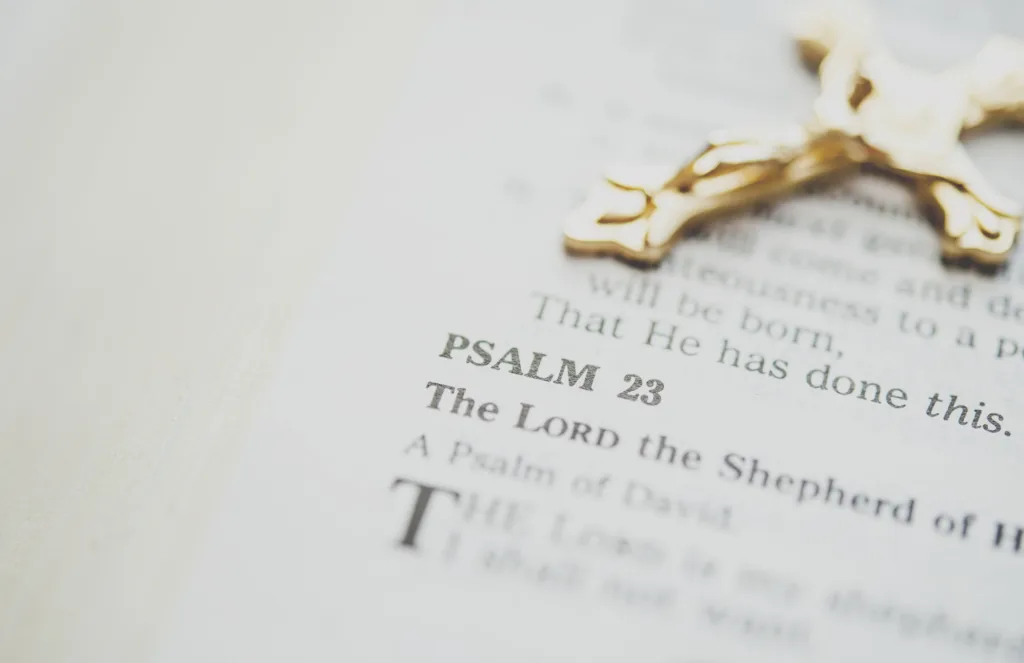Psalms, a book of the Old Testament, is a collection of sacred poems and songs that were meant to be sung. It is one of the most beloved and well-known books of the Bible, with its 150 chapters being read and recited by people of various faiths all over the world.
The book of Psalms is divided into five sections or books, each of which ends with a doxology. The firt section (chapters 1-41) focuses on the individual’s relationship with God and the struggles they face. The second section (chapters 42-72) is primarily concerned with the community’s relationship with God, including the nation of Israel. The third section (chapters 73-89) addresses the problem of evil and the faithfulness of God. The fourth section (chapters 90-106) emphasizes God’s sovereignty and the importance of worship. The final section (chapters 107-150) is a collection of hymns of praise and thanksgiving.
One of the most well-known and beloved psalms is Psalm 23, which begins with the words “The Lord is my shepherd…” This psalm is a reminder of God’s care and protection for his people, even in the midst of difficult circumstances. It speaks of God leading and guiding his people, providing them with rest and refreshment, and protecting them from harm.
Another popular psalm is Psalm 27, which begins with the words “The Lord is my light and my salvation…” This psalm expresses the psalmist’s confidence in God’s protection and deliverance. It also contains a prayer for guidance and instruction, as well as a declaration of faith in God’s goodness.
The book of Psalms is not only a collection of beautiful poetry and songs, but it also serves as a rich source of spiritual wisdom and guidance. It speaks to the human experience in all its joys and sorrows, and offers hope and comfort to those who trust in God.
The book of Psalms is a treasure trove of sacred poetry and songs that has been cherished by believers for centuries. Its themes of faith, trust, and God’s faithfulness continue to speak to people of all ages and backgrounds today. As we read and meditate on these timeless words, may we be reminded of God’s love and care for us, and may our hearts be lifted in praise and thanksgiving.
Is It Psalm 23 Or Psalms 23?
The correct title for the well-known biblical passage is “Psalm 23,” not “Psalms 23.” The Book of Psalms contains 150 individual psalms, each with its own unique number. Therefore, it is important to use the correct title to avoid confusion and ensure accuracy when referring to a specific psalm.

How Do You Reference Psalms?
When referencing a Psalm in your writing, it is important to follow a specific format to ensure proper citation. The first step is to indicate the book of the Bible in which the Psalm is found, followed by the specific Psalm number. If you are quoting specific lines from the Psalm, you should also include those after the Psalm number, separated by a period.
For example, if you were referencing Psalm 23 and quoting the first line, your citation would look like this: (Psalm 23.1).
It is also important to note that different citation styles may have slightly different formats for referencing Psalms. Therefore, it is important to consult the appropriate style guide for your discipline or assignment to ensure that you are following the correct format. Additionally, if you are referencing a Psalm multiple times throughot your writing, it may be helpful to use abbreviations or shorthand to avoid repetition. You can also use bullet lists to explain the content if necessary.
Do You Pronounce The S In Psalms?
You do not pronounce the S in Psalms. The word is pronounced as “sahmz” with a silent S at the beginning. It is important to note that the pronunciation of this word may vary depending on the dialect or accent of the speaker. However, in standard English, the S in Psalms is not pronounced.
How Do You Spell Psalms As In The Bible?
The spelling of Psalms in the Bible is P-S-A-L-M-S. It is a book of the Old Testament that consists of sacred songs or poems, often sung in worship. The word “Psalms” is derived from the Greek word “psalmos,” which means “song sung to a harp.” It is the first book in the third section of the biblical canon, known as the Writings (Hebrew Ketuvim).
Conclusion
The Book of Psalms is a significant part of the Old Testament and is composed of sacred songs and poems meant to be sung. It is a collection of 150 individual psalms, each with its own unique theme and message. Psalm 23, in particular, is one of the most well-known and beloved psalms, oten recited at funerals and other solemn occasions. Its message of God’s guidance and protection, likened to that of a shepherd for his flock, has resonated with people for centuries. The Book of Psalms continues to be studied and appreciated for its literary and spiritual value, and its themes and messages remain relevant to modern-day readers.
